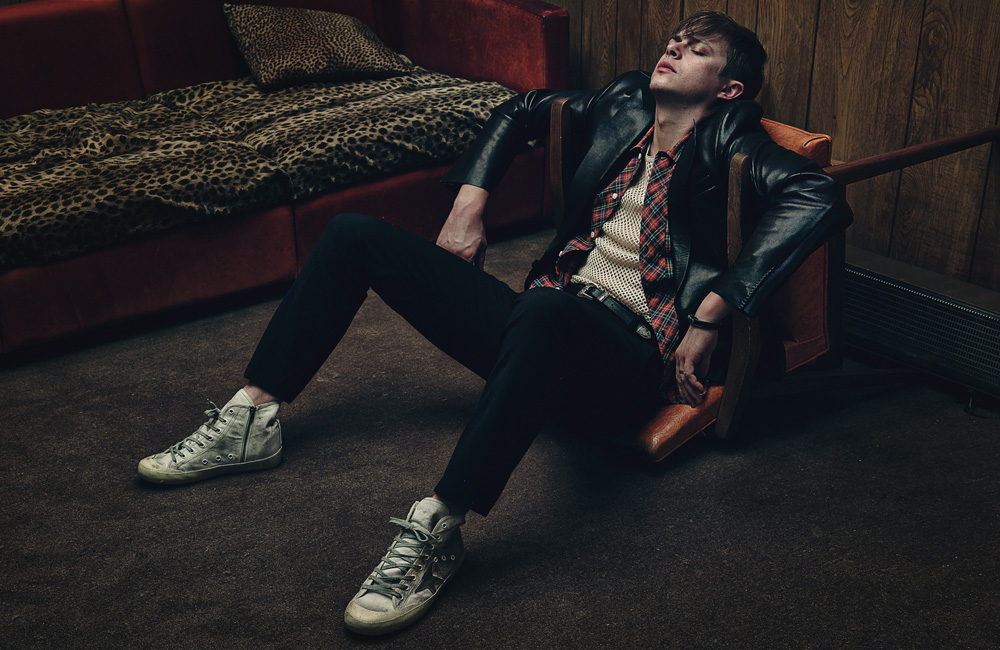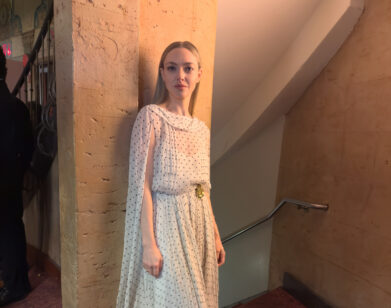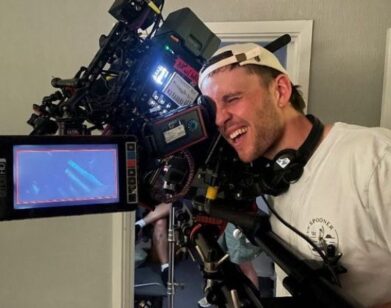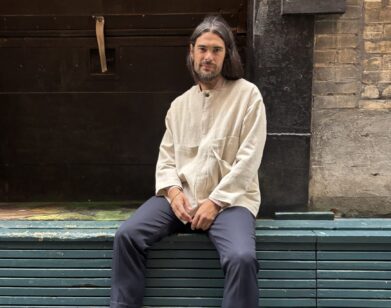Dane DeHaan
Comic-book movies are where my childhood fantasies meet my adulthood acting fantasies. I really, truly started acting by playing superheroes in my backyard.Dane DeHaan
Self-confessed theater geek Dane DeHaan left his hometown of Allentown, Pennsylvania, while he was still in high school to study acting at the University of North Carolina School of the Arts. Television roles (on HBO’s In Treatment and True Blood, among others) came quickly, and soon DeHaan was racking up an impressive roster of film credits. In a matter of just four years, he has worked with John Sayles (in the 2010 war saga Amigo), with John Hillcoat (across from Tom Hardy and Shia LaBeouf in 2012’s Lawless), with Steven Spielberg (reciting the Gettysburg Address to the president in 2012’s Lincoln), and with Derek Cianfrance (in 2012’s The Place Beyond the Pines). In last year’s Kill Your Darlings, he played Lucien Carr, a college friend of Jack Kerouac and Allen Ginsberg, who in 1944 murdered his admirer David Kammerer, and initially had his beatnik buddies help cover it up (Carr ultimately pled guilty to manslaughter and served 18 months at a reformatory).
Now 28, DeHaan again plays a real-life murder suspect (this time, Chris Morgan, a peripheral character in the West Memphis child murders), alongside Reese Witherspoon and Colin Firth, in director Atom Egoyan’s Devil’s Knot, about the West Memphis Three, out this month. He’ll also appear in the little drama The Amazing Spider-Man 2 as Peter Parker’s nemesis Harry Osborn—a playboy who morphs into the Green Goblin.
And for his next project, the young actor who has made a name playing troubled adolescents takes on his dream role, playing Mister Moody himself, James Dean, in Anton Corbijn’s forthcoming Life (opposite Robert Pattinson, who plays photographer Dennis Stock). If this series of roles sounds somewhat familiar, we thought it did too. And so we asked James Franco, who broke out in 2001 as the lead in the TNT movie James Dean and played Osborn in the Tobey Maguire-era Spideys (as well as Allen Ginsberg in Howl, 2010), to give DeHaan a call. Franco, who is presently doing Of Mice and Men on Broadway, rang from Brooklyn to discover that DeHaan, who’d recently flown to New York from Toronto, was only a few blocks away.
JAMES FRANCO: Hello, Dane. What were you doing in Toronto?
DANE DEHAAN: I was doing the film Life, in which I play James Dean.
FRANCO: That’s about the period that James Dean hung out with the photographer who did a photo series of him, right?
DEHAAN: Dennis Stock, yeah. Two weeks before East of Eden [1955] came out, Dean and Stock traveled from L.A. to New York, spent some time in New York, and then they went back to Dean’s home in Indiana. The movie is about those two weeks of their lives.
FRANCO: So, while they were in New York, did Dennis Stock shoot the photo of Dean in Times Square that provided the model for that painting called Boulevard of Broken Dreams?
DEHAAN: Yeah, that’s his.
FRANCO: And then they went to Indiana and did all these cool shots of Dean on the farm?
DEHAAN: Yeah, like, with the cows, and playing the bongos and that kind of thing.
FRANCO: [laughs] Did you do all that stuff?
DEHAAN: Well, not all of it—there are a ton of photos. We took the most well-known ones, and told the story through the photos. So, you’re following them and see how the pictures happened.
FRANCO: Oh, cool. Because your director is also a photographer, right?
DEHAAN: Yeah, Anton Corbijn is a photographer. But he’s made four feature films now.
FRANCO: So the drive of the movie is just about how they made those photos, or is there something else going on?
DEHAAN: It’s the story of how James Dean is the catalyst and muse for the photographer. In the beginning of the story, Stock is an artist who’s worried about his future. From his experience with Dean, he learns to live in the present and what it means to be an artist.
FRANCO: If I remember it right, James Dean almost got in a motorcycle accident at Laurel Canyon and Sunset, and that’s how he met him? Was that Stock?
I’m really bad at lying. I’m one of the worst liars I know. But if I can convince myself to believe something’s happening, I can do that. Dane DeHaan
DEHAAN: No, he met Stock at the Chateau [Marmont] at a party that Nick Ray was throwing in 1954. Nick Ray introduced him and said, “You should get to know this kid—he’s got a movie coming out.”
FRANCO: Was that Rebel Without a Cause [1955]?
DEHAAN: He hadn’t even been quite cast in Rebel yet. He was probably going to get it, and then Nick Ray threw this party and he showed up. He went to the party to keep hope alive, I suppose. Dennis went and saw East of Eden the next day, and was like, “Holy shit, who is this guy? I have to do a photo essay on him.” And that’s how it all kind of began.
FRANCO: And when they went back to Indiana, Dean went back to his high school—
DEHAAN: He went to the high school dance. There are photos of him signing autographs and playing the bongos with the four-piece band. There’s also a really beautiful photo, one of my favorites, with him sitting on an empty stage in the high school auditorium.
FRANCO: You grew up in Pennsylvania, right?
DEHAAN: Yeah, Allentown.
FRANCO: Do you ever go back there?
DEHAAN: Sometimes, around Thanksgiving, but rarely. My sister still lives in the same town where we grew up, but I don’t make it back there much.
FRANCO: I’ve had a developing relationship with people that I knew when I was younger, and I really enjoy going back home. But for a while it was weird. It sounds like James Dean had a pretty good homecoming, but, like, Janis Joplin went back home, and they still rejected her. What is your experience?
DEHAAN: I feel like home meant a lot more to Dean than it does to me. For him it was a place that he became a boy again, you know? But for me it feels foreign. I haven’t spent much time there since I was 17. Now when I go home, I don’t really know my way around. Everything’s changed a little bit.
FRANCO: You don’t keep in touch with people that you knew when you were a teenager?
DEHAAN: One. This kid I grew up next to. I’ve known him since we were six months old. I still have a friendship with him and this one girl I went to high school with. And that’s it.
FRANCO: Did you act in high school?
DEHAAN: Yeah, big time. I was a total theater kid.
FRANCO: What were some of the highlights?
DEHAAN: Well, it’s funny because I went to a predominantly white school, but for some reason they always picked the musicals that were supposed to be done by totally black casts. We did The Wiz, and it was a bunch of white kids doing The Wiz. I played the Wiz.
I love being directed. I always find it helpful to have someone else’s brain in the mix and not just have to rely on myself. Dane DeHaan
FRANCO: Is that Michael Jackson’s role?
DEHAAN: I think he was the Scarecrow. I don’t remember who the Wiz was.
FRANCO: Wait, so you played the Wiz? Like, the wizard?
DEHAAN: Oh, wait, you were the wizard! [both laugh]
FRANCO: We’ve played so many similar roles. What the hell, man! I guess we could say that you played the wizard first, though. I read that James Dean is one of your favorite actors. Is that true?
DEHAAN: He is.
FRANCO: As an actor looking at another actor, what do you think you could learn from him? Or what do you think made you like his work?
DEHAAN: I think what makes me like his work is how real he was—he’s emotional and open, but living in the moment and so impulsive. It seems like he followed his impulses better than anyone I can think of. Watching the old movies and seeing him be amazing even by modern standards of acting, everyone else just pales in comparison. It’s a really impressive thing. And it’s been an interesting process, getting to know more about him for the role. I always thought he was really into learning how to act and the craft of acting, but it seems as though he was self-obsessed with his own process. He didn’t want to be taught anything. He only went to, like, a very few acting classes, even though he fought so hard to get into the Actors Studio. As soon as he went, he got torn apart by Lee Strasberg and then basically never went up again.
FRANCO: Exactly.
DEHAAN: I always thought he was this acting nerd like I am. He was just born with the talent to act and this vivid imagination. But the way he went about getting there was actually kind of annoying. He’d trap himself in his trailer for hours before he would do a take and everyone was just kind of waiting around for him.
FRANCO: When you say you’re an acting nerd, what do you mean? Like, doing theater, or have you trained? How is what you do different from his approach?
DEHAAN: I guess Dean did as much theater in high school as he could. I just mean studying acting itself, going to school for it. I loved learning about it. I loved getting classical training in terms of acting. I would’ve stayed in acting school for the rest of my life if I could have. It was this amazing period of my life where everything was so safe.
FRANCO: That was in North Carolina?
DEHAAN: At the University of North Carolina School of the Arts. It’s the only state-run conservatory in the nation. They have a one-year senior year of high school program that I went to. And then the four-year college program that I also went to. You only have two hours of academics a day, and then the rest of your time is just spent taking acting class, taking dance class, taking speech class.
FRANCO: Dean was mean to Raymond Massey on the set of East of Eden because he and Elia Kazan thought that he needed Massey, who played his father, to really hate him—and vice versa—in order to play that role. I would never do anything like that. I never wanted to get in the way of anybody else’s work. But how do you reconcile that kind of live, vital, raw expressiveness of James Dean while still being a collaborative partner on movies, which are a very collaborative medium?
I always thought [James Dean] was this acting nerd like I am. He was just born with the talent to act and this vivid imagination. But the way he went about getting there was actually kind of annoying.Dane DeHaan
DEHAAN: The easy answer is that you save the bad boy for when you’re on camera. Once the cameras start rolling, you have permission to act that way.
FRANCO: But it’s important for you to have a healthy kind of working relationship with your director and your collaborators?
DEHAAN: Ideally. I love being directed. I always find it helpful to have someone else’s brain in the mix and not just have to rely on myself.
FRANCO: You play Harry Osborn—another role that we’ve both done—in the new Spider-Man. What were your thoughts on taking the role? I mean, it’s a superhero movie; that’s always just something to consider because they’re so big, there’s so much expectation for them, the characters have had a life before you, and there’s this whole fan-base that has their own relationships with the characters. You could certainly defy expectations, but you’re definitely working with material that people have prior relationships with.
DEHAAN: Honestly, I was all about it. I had to fight really hard just to be considered for the role. I think they had a different thing in mind, and they weren’t letting me audition for it for the longest time. I feel like with comic-book movies and all the pressure and expectation, if you can kind of block all that out, they are where my childhood fantasies meet my adulthood acting fantasies. You get to go back to where you started. I really, truly started acting by playing superheroes in my backyard. And then it morphed into this thing where I started taking acting really seriously. And then in my late twenties I got to be a superhero but take it more seriously than ever. Harry Osborn is kind of like an archetype of a character because he’s been reincarnated again and again, like when you’re doing a play and you’re doing a part that has been done many times before. In this case, there’s almost more freedom because you’re not saying the exact same words and you’re not going through the exact same things.
FRANCO: Were you a Spider-Man comic fan when you were young?
DEHAAN: Well, I never really read comics. I loved the movies and I loved cartoon superheroes—superheroes in general. I had all the pajama costumes and I would wear my underwear on the outside of the pajamas because that’s what Superman does. Teenage Mutant Ninja Turtles was huge.
FRANCO: Yeah, TMNT was good. So when you got this role, was reading the comic books any part of your preparation?
DEHAAN: I read some of the older comics just to get the origins of Green Goblin and to find the first time Harry Osborn appears to see what he’s gone through. He’s still the party boy. He’s still the trust-fund kid.
FRANCO: There is a three-comic-book arc where Harry Osborn does some sort of hallucinogenic drugs. Back in the day, those three issues weren’t given the comic-book seal of approval—I guess there used to be literally a little seal of approval on each book, some sort of censorship thing. At the time, they didn’t approve it, and Stan Lee decided to run it anyway without the seal of approval.
DEHAAN: Our Harry is definitely a party boy. But you can’t really show people doing drugs in those movies, so I drink. [laughs]
FRANCO: Another of our other areas of common interest is the Beats. I really liked your performance as Lucien Carr in Kill Your Darlings. I thought that you guys did a really good job of telling who they were when they were young, before they were the people that everybody knew. When I played Allen Ginsberg in Howl, I remember thinking, “God, it must’ve been so crazy.” Here, his friend Lucien kills one guy, and then his buddy William Burroughs kills his wife. When I heard about Darlings, I thought, “Wow, that’ll be tricky.” What was your approach to this character, to make him watchable?
I like to believe that most human beings go about things with a point of view that they’re just doing what they feel like they need to do at that time. Sometimes people make bad decisions, but it’s not evil.” Dane DeHaan
DEHAAN: I probably went into the situation pretty naively, not knowing that much about them. But just like every role I play, it became about finding out who Lucien was and what drove him to do the things he did. I like to believe that most human beings go about things with a point of view that they’re just doing what they feel like they need to do at that time. Sometimes people make bad decisions, but it’s not evil, not malicious. I think that when you’re playing someone who does really questionable or even really terrible things in a movie, it’s important to show where that person is coming from. They’re doing it from a necessary impulse. There is a struggle that’s going on within them as a human.
FRANCO: I’m curious because this is something I think about. If you achieve that—if you communicate what’s going on with the person as an actor—what does that do? Why is that your goal as an artist?
DEHAAN: That’s a big question. I guess it’s all about discovering the truth. Acting is all about being truthful. I’m really bad at lying. I’m one of the worst liars I know. But if I can convince myself to believe something’s happening, I can do that. I have an imagination, and that’s what acting is. That’s the job. And the end result, then, is people watching the movie and being like, “Oh, wow, I felt for that guy who just murdered that person,” or, you know, “I was kind of on that person’s side even though they were doing these questionable things.”
FRANCO: [laughs] It sounds like you can’t play a character unless you understand something about why they’re doing what they do.
DEHAAN: Absolutely not. My process is all about what they’re doing and why they’re doing it.
FRANCO: And in the movie you did with Atom Egoyan, Devil’s Knot, you play an alleged killer, right?
DEHAAN: I don’t play one of the West Memphis Three. I play another suspect in the crime.
FRANCO: Okay, so, let’s say you make an audience feel for a character that maybe they’d normally not feel for. If you achieve that, then what? Is it to provide us a greater understanding of each other? I just did this movie called True Story with Jonah Hill. It’s based on a true story, and I play the most horrible person I could ever imagine. I do not like one thing about this guy. He murdered his family, he murdered his three kids and his wife. I don’t want the audience to tune out from the beginning because of what he did. So I try and provide this other side to make him watchable, but in the end, I don’t want people to sympathize with this dude. He’s the worst. He’s horrible. It’s a question I always ask myself when I’m playing these sort of darker characters. You never wanna be winking at the audience and saying, “Hey, this guy’s really bad, but it’s not me.” You always want to be fully committed to the character. But then when you’re all done, sometimes I’m still asking, “Okay, what did I do? Was what I did good? I hope people read it right. I hope nobody thinks murdering is cool or something,” you know what I mean?
DEHAAN: I don’t really have that fear. [laughs] Even if you become sympathetic for somebody who has done something terrible, I don’t think that necessarily makes what they did look cool. I’ve never spent a lot of time thinking about the end result, the impact it has on the world. But hopefully the audience has a deeper understanding of the human condition and what drives people to do things that are not good. Maybe that hits home with them, and in a way, it’s almost therapeutic for them to see somebody struggling with something and making the wrong decision.
FRANCO: Is there some underlying thing that you think drives you to take the kinds of projects that you do? And let’s just bring up—I’m not bitter, but let’s just bring it up—you did turn me down for a role in my movie The Sound and the Fury. I was thinking that you would love it. But I think you said, “I never understood the book in high school and I still don’t get it now,” or something like that. [both laugh]
DEHAAN: I think that ultimately what drives my decisions is if I think the opportunity is going to challenge me in a way that makes me better as an actor. What’s going to make me grow the most? If the opportunity is presented to me and I’m kind of like, “Oh, my God, I have no idea if I can even do that, it seems like an impossible task …” Like the James Dean thing, I had no idea if I could pull that off; it seemed like something really far away. I didn’t look at myself and think, “Oh, I look like him,” or “I am him.” I didn’t really think I could pull it off, and that’s why I wanted to do it, to see if I could get myself to the place where I could do that, you know? There’s this quote that has kind of become a mantra in my life. It’s from the Bhagavad Gita. And it goes a little something like this: “You have the right to the work, but for the work’s sake only. You have no right to the fruits of the work. Desire for the fruits of the work must never be your motive in working. Never give way to laziness either. Perform …” Well, then it gets kind of religious. But, basically, what I think it’s saying is that all you can really trust in is your own personal journey in the work. I can’t worry what it’s going to do in my life, or what impact it’s going to have. All I can really focus on is the task at hand, you know?
FRANCO: Cool, man. Great talking to you. I really enjoyed it. I did a painting of you I hope you don’t mind. It’s a little goofy—my style is a little goofy.
DEHAAN: I can’t wait to see it. I’m hoping to go see Of Mice and Men sometime.
FRANCO: Just let me know when you want to come and I’ll set you up.
JAMES FRANCO IS AN ACTOR, ARTIST, AUTHOR, SCREENWRITER, AND DIRECTOR. THE FILM ADAPTATION OF HIS SHORT STORY COLLECTION, PALO ALTO, IN WHICH HE STARS, IS OUT THIS MONTH.







